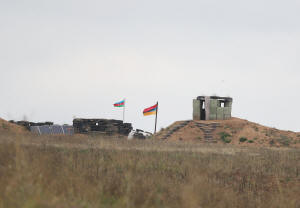Russia says Karabakh Armenian fighters start giving up arms
 Send a link to a friend
Send a link to a friend
 [September 23, 2023]
By Felix Light [September 23, 2023]
By Felix Light
NEAR KORNIDZOR, Armenia (Reuters) - Russia said that Armenian fighters
in the breakaway region of Nagorno Karabakh had started to give up arms
as some humanitarian aid reached the 120,000 Armenians there who say the
world has abandoned them after Azerbaijan defeated their forces.
The Armenians of Karabakh, which is internationally recognised as part
of Azerbaijan, were forced to declare a ceasefire on Sept. 20 after a
lightning 24-hour military operation by the much larger Azerbaijani
military.
"The armed formations of Karabakh have begun handing over weapons and
military equipment under the control of Russian peacekeepers," said
Russia, which has around 2,000 peacekeepers in Karabakh.
Russia's defence ministry said so far six armoured vehicles, more than
800 guns, about 5,000 units of ammunition were handed over by the
fighters.
Russia said it had delivered more than 50 tonnes of food and other aid.
The International Committee of the Red Cross (ICRC) said it had supplied
28,000 diapers as well as blankets and fuel and said it would send more.
The future of Karabakh and its 120,000 ethnic Armenians hangs in the
balance: Azerbaijan wants to integrate the long-contested region, but
ethnic Armenians say they fear they will be persecuted and have accused
the world of abandoning them.

Armenians in Karabakh told Reuters that they were essentially besieged
in the region, with little food, electricity or fuel - and called on big
powers to help them.
Azerbaijan envisages an amnesty for Karabakh Armenian fighters who give
up their arms and has said the Armenians can leave the region for
Armenia if they want.
Armenia, which lost a 2020 war to Azerbaijan over the region, has set up
space for tens of thousands of Armenians from Karabakh, though Prime
Minister Nikol Pashinyan says he does not want them to leave their homes
unless it is absolutely necessary.
'ABANDONED'
Azerbaijan began its "anti-terrorist" operation on Tuesday against
Nagorno-Karabakh after some of its troops were killed in what Baku said
were attacks from the mountainous region.
The United States said it was deeply concerned by "Azerbaijanís military
actions".
[to top of second column]
|

A view shows the Armenian border guard post next to the Azerbaijani
border guard post on the road leading from Armenia to Azerbaijan's
Nagorno-Karabakh region, as seen from the outskirts of the village
of Tegh, Armenia September 21, 2023. REUTERS/Irakli Gedenidze/File
Photo

U.S. Secretary of State Antony Blinken also said he was "concerned
about the humanitarian situation for the population inside
Nagorno-Karabakh, and the imperative of having unimpeded access for
humanitarian organizations to reach populations in need is also
front and center in our thinking".
Accounts of the fighting were chilling.
Armenui Karapetyan, an Armenian in Karabakh, said he was now
homeless, holding just a few possessions and a photograph of his
24-year-old son who died in 2020, after leaving his home in the
village of Kusapat.
"Today we were thrown out into the street - they made us vagabonds,"
Karapetyan told Armenia A1+, a partner of Reuters.
"What can I say? We live in an unfair, abandoned world. I have
nothing to say. I feel sorry for the blood of our boys. I feel sorry
for our lands for which our boys sacrificed their lives, and
today... I miss the grave of my son."
Thousands of Karabakh Armenians have massed at the airport seeking
the protection of Russian peacekeepers there.
Svetlana Alaverdyan, from the village of Arajadzor, said she had
fled with just the clothes on her back after gun fights gripped the
village.
"They were shooting on the right, they were shooting on the left -
we went out one after another, without taking clothes," she told
Armenia A1+.
"I had two sons - I gave them away, what else can I give? The
superpowers resolve their issues at our expense."
(Writing by Guy Faulconbridge; Editing by Gareth Jones)
[© 2023 Thomson Reuters. All rights
reserved.]This material
may not be published, broadcast, rewritten or redistributed.
Thompson Reuters is solely responsible for this content.
 |